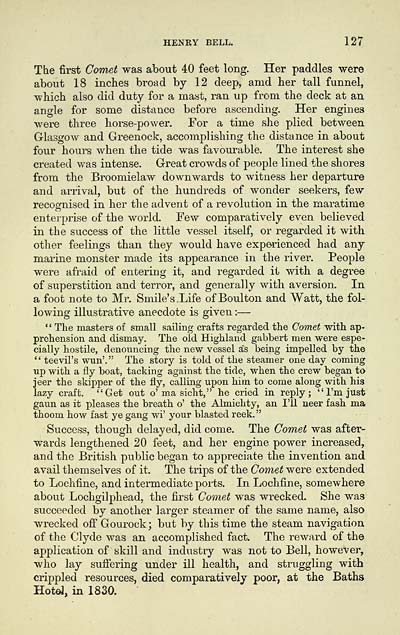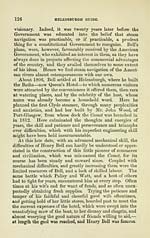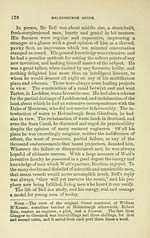Download files
Complete book:
Individual page:
Thumbnail gallery: Grid view | List view

HENRY BELL. 127
The first Comet was about 40 feet long. Her paddles were
about 18 inches broad by 12 deep, amd her tall funnel,
which also did duty for a mast, ran up from the deck at an
angle for some distance before ascending. Her engines
were three horse-power. For a time she plied between
Glasgow and Greenock, accomplishing the distance in about
four hours when the tide was favourable. The interest she
created was intense. Great crowds of people lined the shores
from the Broomielaw downwards to witness her departure
and arrival, but of the hundreds of wonder seekers, few
recognised in her the advent of a revolution in the maratime
enterprise of the world. Few comparatively even believed
in the success of the little vessel itself, or regarded it with
other feelings than they would have experienced had any
marine monster made its appearance in the river. People
were afraid of entering it, and regarded it with a degree
of superstition and terror, and generally with aversion. In
a foot note to Mr. Smile's. Life of Boulton and Watt, the fol-
lowing illustrative anecdote is given : —
" The masters of small sailing crafts regarded the Comet with ap-
prehension and dismay. The old Highland gabbert men were espe-
cially hostile, denouncing the new vessel als being impelled by the
" teevil's wun'." The story is told of the steamer one day coming
up with a fly boat, tacking against the tide, when the crew began to
jeer the skipper of the fly, calling upon him to come along with his
lazy craft. "Get out o' ma sicht," he cried in reply; "I'm just
gaun as it pleases the breath o' the Almichty, an I'll neer fash ma
thoom how fast ye gang wi' your blasted reek."
Success, though delayed, did come. The Comet was after-
wards lengthened 20 feet, and her engine power increased,
and the British public began to appreciate the invention and
avail themselves of it. The trips of the Comet were extended
to Lochfine, and intermediate ports. In Lochfine, somewhere
about Lochgilphead, the first Comet was wrecked. She was
succeeded by another larger steamer of the same name, also
wrecked off Gourock; but by this time the steam navigation
of the Clyde was an accomplished fact. The reward of the
application of skill and industry was not to Bell, however,
who lay sufi'ering under ill health, and struggling with
crippled resources, died comparatively poor, at the Baths
Hotel, in 1830.
The first Comet was about 40 feet long. Her paddles were
about 18 inches broad by 12 deep, amd her tall funnel,
which also did duty for a mast, ran up from the deck at an
angle for some distance before ascending. Her engines
were three horse-power. For a time she plied between
Glasgow and Greenock, accomplishing the distance in about
four hours when the tide was favourable. The interest she
created was intense. Great crowds of people lined the shores
from the Broomielaw downwards to witness her departure
and arrival, but of the hundreds of wonder seekers, few
recognised in her the advent of a revolution in the maratime
enterprise of the world. Few comparatively even believed
in the success of the little vessel itself, or regarded it with
other feelings than they would have experienced had any
marine monster made its appearance in the river. People
were afraid of entering it, and regarded it with a degree
of superstition and terror, and generally with aversion. In
a foot note to Mr. Smile's. Life of Boulton and Watt, the fol-
lowing illustrative anecdote is given : —
" The masters of small sailing crafts regarded the Comet with ap-
prehension and dismay. The old Highland gabbert men were espe-
cially hostile, denouncing the new vessel als being impelled by the
" teevil's wun'." The story is told of the steamer one day coming
up with a fly boat, tacking against the tide, when the crew began to
jeer the skipper of the fly, calling upon him to come along with his
lazy craft. "Get out o' ma sicht," he cried in reply; "I'm just
gaun as it pleases the breath o' the Almichty, an I'll neer fash ma
thoom how fast ye gang wi' your blasted reek."
Success, though delayed, did come. The Comet was after-
wards lengthened 20 feet, and her engine power increased,
and the British public began to appreciate the invention and
avail themselves of it. The trips of the Comet were extended
to Lochfine, and intermediate ports. In Lochfine, somewhere
about Lochgilphead, the first Comet was wrecked. She was
succeeded by another larger steamer of the same name, also
wrecked off Gourock; but by this time the steam navigation
of the Clyde was an accomplished fact. The reward of the
application of skill and industry was not to Bell, however,
who lay sufi'ering under ill health, and struggling with
crippled resources, died comparatively poor, at the Baths
Hotel, in 1830.
Set display mode to: Large image | Transcription
Images and transcriptions on this page, including medium image downloads, may be used under the Creative Commons Attribution 4.0 International Licence unless otherwise stated. ![]()
| Scottish Post Office Directories > Towns > Helensburgh > Battrum's guide and directory to Helensburgh and neighbourhood > (135) |
|---|
| Permanent URL | https://digital.nls.uk/85143406 |
|---|
| Description | Directories of individual Scottish towns and their suburbs. |
|---|
| Description | Around 700 Scottish directories published annually by the Post Office or private publishers between 1773 and 1911. Most of Scotland covered, with a focus on Edinburgh, Glasgow, Dundee and Aberdeen. Most volumes include a general directory (A-Z by surname), street directory (A-Z by street) and trade directory (A-Z by trade). |
|---|


